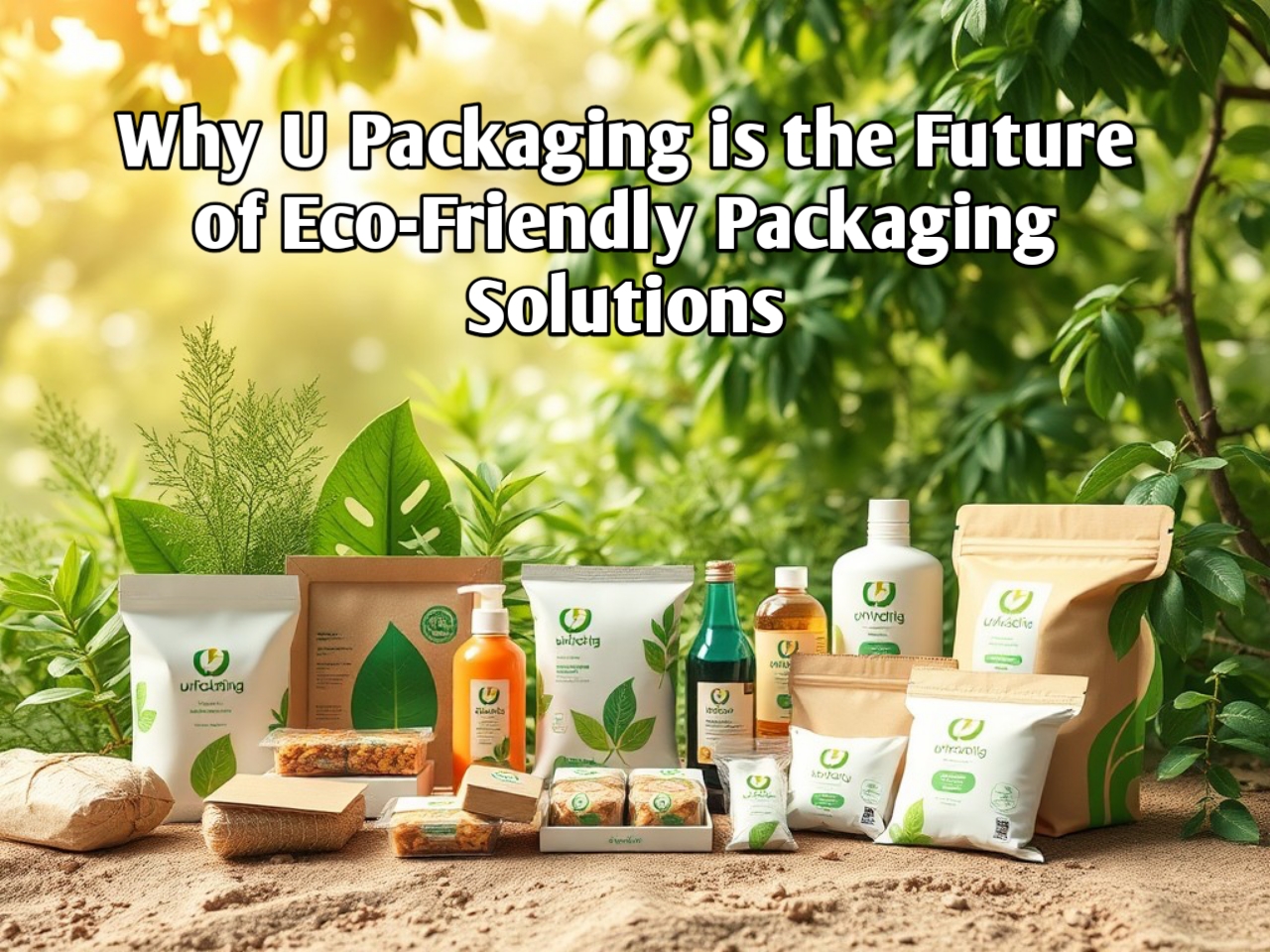Why U Packaging is the Future of Eco-Friendly Packaging Solutions
In today’s environmentally conscious world, sustainable packaging is not just a trend; it’s a necessary shift for businesses across industries. “U Packaging” has recently emerged as a groundbreaking eco-friendly packaging solution designed to reduce environmental impact and align with modern sustainability goals. With the rise in environmental awareness, consumers and companies alike are seeking alternatives to traditional packaging, which has long relied on plastic and other non-renewable materials.
U Packaging represents a response to the growing demand for sustainable alternatives, aiming to create packaging solutions that minimize waste, are made from renewable materials, and contribute to a healthier planet. This article explores why U Packaging is rapidly becoming a preferred choice for environmentally responsible businesses, what sets it apart from other packaging options, and how it can help meet future sustainability needs.
The Environmental Impact of Traditional Packaging Materials
Traditional packaging materials, such as plastics, contribute heavily to environmental pollution. Plastics, derived from fossil fuels, are not biodegradable and can take hundreds of years to break down, leading to long-lasting pollution in oceans, soil, and the atmosphere. The production process for plastic packaging generates substantial greenhouse gases, and only a fraction of it is recycled, leaving the majority to either accumulate in landfills or pollute natural environments.
According to recent studies, the global plastic waste crisis has reached critical levels, with an estimated 300 million tons of plastic waste produced annually. Single-use plastic packaging remains one of the main culprits, as it is disposed of after one use, contributing significantly to the waste problem. This ecological crisis has pressured industries to seek alternatives that reduce their environmental impact, making the introduction of U Packaging both timely and impactful.
How U Packaging Works: Key Features and Benefits
U Packaging is a cutting-edge sustainable solution that leverages biodegradable, recyclable, and often reusable materials to create eco-friendly packaging. Designed with functionality and minimal environmental impact in mind, U Packaging prioritizes the use of materials that break down easily or can be recycled multiple times without degrading in quality.
A standout feature of U Packaging is its versatility. Unlike traditional eco-friendly options, which sometimes compromise on durability, U Packaging materials are engineered to be robust and practical for various applications. This ensures that companies don’t have to sacrifice quality or performance for sustainability. With the choice to reuse, recycle, or compost, U Packaging offers businesses flexibility in meeting their sustainability goals while giving consumers eco-conscious options.
Sustainable Materials Used in U Packaging
One of the core aspects that make U Packaging an eco-friendly choice is its use of sustainable materials. These include plant-based plastics, biodegradable polymers, recycled paper, and even materials derived from agricultural waste. For instance, plant-based plastics are made from renewable sources like cornstarch, which can biodegrade under specific conditions, unlike traditional petroleum-based plastics.
Additionally, U Packaging incorporates recycled paper and cardboard that can be reused multiple times, reducing the need for virgin materials. Some variations of U Packaging utilize agricultural by-products like bagasse (sugarcane fiber) and wheat straw, which would otherwise go to waste. By repurposing these materials, U Packaging effectively contributes to waste reduction and creates a sustainable alternative to conventional options.
Comparing U Packaging to Other Eco-Friendly Packaging Options
When comparing U Packaging to other eco-friendly packaging solutions, several unique benefits emerge. Other green options, such as compostable packaging, reusable containers, and edible films, offer valuable environmental benefits but may lack versatility or affordability. Compostable packaging, for example, is effective but may require specific composting facilities to break down properly, which limits its applicability.
U Packaging, by contrast, is designed for broader use, integrating recycled and plant-based materials that maintain strength and durability while reducing waste. Furthermore, U Packaging is relatively cost-effective as it can be easily adapted to existing production lines. While reusable packaging is an excellent sustainable choice, it is less feasible for certain industries, like food and beverage, where single-use options are more practical. By offering recyclable, biodegradable, and reusable options, U Packaging stands out as a flexible and accessible alternative for various sectors.
U Packaging’s Role in a Circular Economy
The concept of a circular economy—a system that emphasizes reusability and waste reduction—is integral to sustainable development. U Packaging supports this model by creating packaging that can either be recycled back into the supply chain or safely composted, depending on the specific product. This closed-loop approach reduces reliance on finite resources, minimizes waste, and encourages businesses to think beyond single-use products.
By utilizing materials that can be repurposed multiple times, U Packaging significantly reduces the need for virgin resources and waste generation, aligning perfectly with circular economy principles. role of U Packaging in a circular economy is especially impactful for companies looking to create sustainable product lifecycles, as it allows for seamless integration of eco-friendly practices without compromising product quality or consumer satisfaction.
U Packaging in Various Industries: Applications and Success Stories
U Packaging has been successfully adopted by industries as diverse as food and beverage, cosmetics, and e-commerce. In the food sector, for example, U Packaging’s biodegradable containers and wrappers provide an eco-friendly solution that reduces waste from single-use plastics. Restaurants and cafes are increasingly adopting U Packaging for to-go containers and utensils, helping to lower their environmental impact while meeting customer expectations for sustainable practices.
The cosmetics industry has also embraced U Packaging. Many brands are now using recyclable containers, eco-friendly fillers, and biodegradable labels that align with their brand’s environmental values. Major e-commerce companies are switching to U Packaging for their shipping needs, opting for recyclable mailers and protective packaging made from biodegradable materials, thus reducing the environmental impact of online shopping.
One notable success story comes from a popular food delivery service that switched to U Packaging materials, resulting in a 30% reduction in waste generated from their packaging. This example highlights how U Packaging’s versatility and performance can make a tangible difference in sustainability.
Consumer Demand for Sustainable Packaging and the Rise of U Packaging
Modern consumers are more informed and aware of the environmental impact of their purchases than ever before. A large portion of today’s consumer base actively seeks products with minimal packaging waste or made with sustainable materials. According to surveys, over 70% of consumers are willing to pay more for eco-friendly packaging, illustrating the shift toward environmental consciousness.
This demand has driven businesses to reconsider their packaging practices, with many now recognizing the value of U Packaging in meeting consumer expectations. U Packaging not only satisfies these demands but also adds value to a brand by showcasing its commitment to environmental stewardship. For companies looking to foster loyalty and appeal to environmentally conscious consumers, U Packaging offers a way to align their practices with their customers’ values.
Challenges and Opportunities for U Packaging in the Market
Despite its benefits, U Packaging faces several challenges, particularly around production costs, supply chain logistics, and sourcing sustainable materials. Eco-friendly materials, though increasingly popular, can be more expensive and may require investments in new technologies or supplier relationships. Furthermore, shifting to U Packaging might necessitate changes in logistics and infrastructure, which can be complex and costly for some businesses.
However, these challenges also present opportunities for innovation and improvement. As demand for U Packaging grows, economies of scale are likely to lower production costs. Continued innovation in material science may lead to new, more cost-effective sustainable materials, making U Packaging even more accessible. The push for sustainable packaging is only expected to grow, giving U Packaging a promising future as companies increasingly prioritize eco-friendly practices.
Future of U Packaging and the Global Impact on Sustainability
The future of U Packaging looks promising as it continues to evolve and respond to global sustainability needs. Advances in material science may bring about even more biodegradable and durable materials, expanding the applications of U Packaging further. Increased global awareness of climate change and resource depletion is likely to continue pushing companies toward solutions like U Packaging that actively reduce environmental impact.
With its focus on reusability, recyclability, and use of renewable materials, U Packaging has the potential to play a crucial role in meeting international environmental targets. By reducing reliance on non-renewable resources and cutting down on waste, U Packaging can help drive large-scale changes toward more sustainable global practices.
Conclusion: Why U Packaging is the Ideal Choice for Sustainable Business Growth
U Packaging represents a significant step forward in sustainable packaging solutions, offering a practical and effective way for businesses to reduce their environmental impact while meeting the growing demand for eco-friendly products. Its versatility, use of renewable materials, and alignment with circular economy principles make it a powerful choice for companies committed to sustainability.
For businesses looking to enhance their brand reputation, meet consumer expectations, and contribute to environmental protection, U Packaging offers a way to achieve these goals without sacrificing quality or functionality. As more companies embrace sustainable practices, U Packaging is well-positioned to lead the way in the transition to a greener, more responsible future for packaging solutions.
Read Also Our This Post: Top Benefits of Using an Automizer for Your Business Operations

Kamran Khatri is a versatile writer and editor at ExpressZone.co.uk, bringing fresh perspectives and insightful commentary across a wide range of topics. With a passion for exploring diverse subjects—from technology, business, and finance to lifestyle, travel, and the arts—Kamran aims to inform, inspire, and engage readers through well-researched articles and thought-provoking content.
His work spans multiple categories including health, education, pets, entertainment, real estate, and sustainability, reflecting his commitment to delivering knowledge that connects with everyday life. Whether breaking down the latest trends, sharing practical tips, or highlighting cultural insights, Kamran’s writing combines clarity with creativity.
When he’s not crafting stories for ExpressZone.co.uk, Kamran enjoys keeping up with global developments, exploring innovative ideas, and connecting with readers who share his curiosity about the world.

